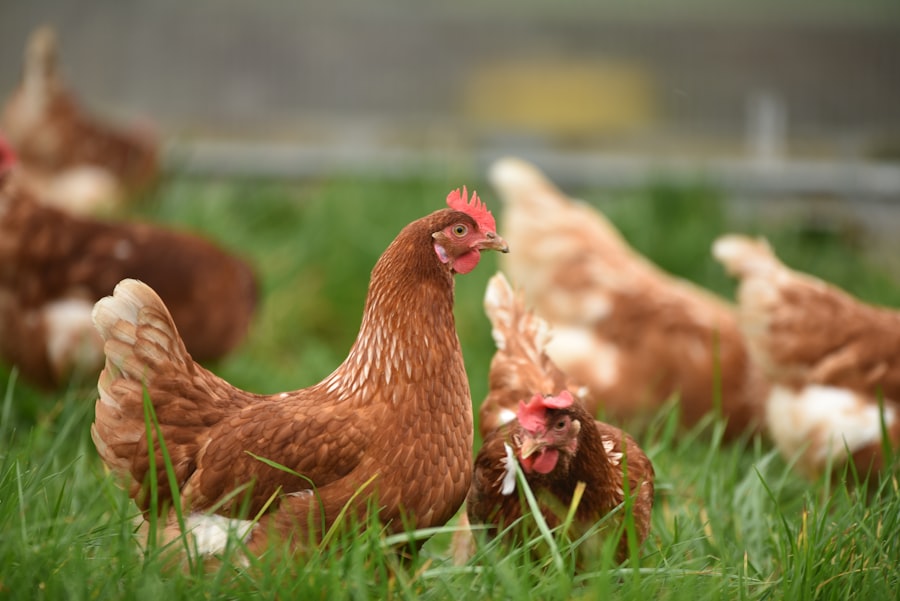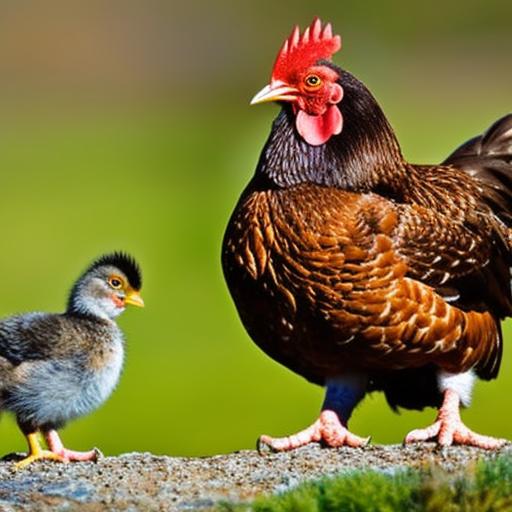Homeowners associations (HOAs) are organizations that establish and enforce rules and regulations for a specific community or neighborhood. These rules can cover a wide range of topics, including pets and livestock. In this blog post, we will focus on the restrictions and regulations that HOAs may have regarding keeping chickens in Idaho. It is important to understand and navigate these restrictions if you are interested in raising chickens in your backyard.
Key Takeaways
- Homeowners Associations (HOAs) have rules and regulations that must be followed by residents.
- HOAs often have restrictions on pets and livestock, including chickens.
- Keeping chickens in Idaho is legal, but there may be local ordinances and HOA restrictions to consider.
- Raising chickens in your backyard can provide fresh eggs and other benefits.
- When building a chicken coop, factors such as size, location, and materials should be considered.
Understanding Homeowners Associations (HOAs)
Homeowners associations are typically formed when a new community or neighborhood is developed. They are responsible for maintaining common areas, enforcing rules and regulations, and collecting fees from homeowners to cover the costs of these services. HOAs are governed by a board of directors, which is usually made up of homeowners within the community.
The purpose of HOA rules and regulations is to maintain the aesthetic appeal and property values of the community. These rules can cover a wide range of topics, including architectural guidelines, landscaping requirements, and restrictions on pets and livestock. The goal is to create a cohesive and harmonious living environment for all residents.
HOA Rules and Regulations on Pets and Livestock
HOA rules and regulations on pets and livestock can vary widely from one community to another. Some HOAs may have strict restrictions on the number and type of pets allowed, while others may have more lenient policies. It is important to review the HOA bylaws before making any decisions regarding pet ownership or livestock keeping.
Common HOA rules on pets may include restrictions on the number of pets allowed per household, size or breed restrictions, leash requirements, and noise regulations. When it comes to livestock, many HOAs prohibit or restrict the keeping of farm animals such as chickens, goats, or pigs. These restrictions are often put in place to maintain the residential nature of the community and prevent nuisances such as noise, odors, or unsightly structures.
The Legality of Keeping Chickens in Idaho
In Idaho, the laws and regulations regarding keeping chickens are generally more lenient compared to other states. However, it is still important to familiarize yourself with the specific regulations in your area. In most cases, keeping a small number of chickens for personal use is allowed in residential areas.
Idaho law does not specifically address backyard chickens, but it does allow for the keeping of poultry for personal use. However, some cities or counties may have their own regulations and restrictions on chicken keeping. It is important to check with your local government or zoning department to ensure compliance with any permits or licenses that may be required.
The Benefits of Raising Chickens in Your Backyard
There are many benefits to raising chickens in your backyard. One of the most obvious benefits is the availability of fresh eggs. Chickens are also great for natural pest control, as they eat insects and other pests that can damage your garden. Additionally, chickens produce high-quality fertilizer that can be used to improve soil health and fertility.
Raising chickens can also be a sustainable practice. By keeping chickens in your backyard, you can reduce your reliance on store-bought eggs and support local food production. Chickens are relatively low-maintenance animals and can be a great educational experience for children.
Factors to Consider When Building a Chicken Coop

When building a chicken coop, there are several factors to consider. First and foremost, you need to ensure that the coop provides adequate space for your chickens to live comfortably. The general rule of thumb is to provide at least 4 square feet of space per chicken inside the coop and 10 square feet per chicken in the outdoor run.
Ventilation is another important factor to consider when building a chicken coop. Good airflow is essential to prevent the buildup of moisture and ammonia, which can lead to respiratory issues for the chickens. Windows or vents should be installed to allow for proper ventilation.
There are many resources available online for finding chicken coop plans and designs. You can also consider purchasing a pre-made coop or hiring a professional to build one for you. It is important to ensure that the coop meets any local building codes or regulations.
HOA Restrictions on Chicken Coops
Many HOAs have specific restrictions on the size, placement, and appearance of chicken coops. These restrictions are often put in place to maintain the aesthetic appeal of the community and prevent any potential nuisances. It is important to review the HOA bylaws and architectural guidelines before building or installing a chicken coop.
Common HOA restrictions on chicken coops may include limitations on the size or height of the coop, requirements for screening or fencing, and restrictions on the placement of the coop within the property. Some HOAs may also require approval from the architectural review committee before building a chicken coop.
How to Negotiate with Your HOA Regarding Chickens and Coops
If you are interested in keeping chickens in an HOA community, but there are restrictions in place, it may be possible to negotiate with the HOA. Here are some tips for negotiating with your HOA regarding chickens and coops:
1. Research and understand the rules: Before approaching the HOA, make sure you have a clear understanding of the rules and regulations regarding pets and livestock. This will help you make a strong case for why you should be allowed to keep chickens.
2. Present your case: Prepare a well-reasoned argument for why keeping chickens would benefit both you and the community. Highlight the educational, environmental, and sustainable aspects of backyard chicken keeping.
3. Offer compromises: If the HOA has concerns about noise, odor, or other potential nuisances, offer solutions to address these concerns. For example, you could propose using a specific type of coop that minimizes noise or odor, or offer to provide regular maintenance and cleaning of the coop.
4. Be respectful and understanding: Remember that the HOA board members are volunteers who are trying to uphold the rules and regulations of the community. Be respectful and understanding of their concerns, and try to find common ground.
Alternative Options for Keeping Chickens in Urban Areas
If keeping chickens in your backyard is not an option due to HOA restrictions or other limitations, there are alternative options for keeping chickens in urban areas. One option is to join a community garden or urban farming organization that allows for shared chicken keeping. These organizations often provide shared coops and resources for members.
Another option is to explore the possibility of shared coops with neighbors or friends who are also interested in raising chickens. By pooling resources and sharing responsibilities, you can still enjoy the benefits of backyard chicken keeping without violating any HOA rules.
Conclusion and Final Thoughts on HOAs and Keeping Chickens in Idaho
In conclusion, navigating HOA restrictions on keeping chickens in Idaho requires careful research and understanding of the rules and regulations. It is important to review the HOA bylaws before making any decisions regarding pet ownership or livestock keeping. If there are restrictions in place, it may be possible to negotiate with the HOA by presenting a well-reasoned argument and offering compromises.
Keeping chickens in your backyard can be a rewarding and sustainable hobby. It provides fresh eggs, natural pest control, and an educational experience for children. However, it is important to be respectful of HOA rules and regulations and consider alternative options if necessary. By doing so, you can enjoy the benefits of backyard chicken keeping while maintaining a harmonious living environment within your community.
If you’re considering keeping chickens in Idaho, it’s important to be aware of the regulations and restrictions that may apply. One related article that provides valuable information on this topic is “The Importance of a Proper Floor for Your Chicken Coop” from PoultryWizard.com. This article discusses the significance of having a suitable floor for your chicken coop, including the different types of flooring options available and their benefits. Understanding the requirements for a chicken coop can help you navigate any potential obstacles that may prevent you from having chickens in your area. To learn more about this topic, check out the article here.
FAQs
What is HOA?
HOA stands for Homeowners Association. It is a private organization that manages and governs a residential community or neighborhood.
Can HOA restrict residents from having chickens in Idaho?
Yes, HOA can restrict residents from having chickens in Idaho. The HOA has the power to create and enforce rules and regulations that govern the use of properties within the community.
What are the reasons why HOA restricts residents from having chickens?
HOA restricts residents from having chickens for various reasons, including noise, odor, and potential health hazards. Chickens can also attract predators and pests, which can be a nuisance to the community.
What should I do if I want to keep chickens in an HOA community in Idaho?
If you want to keep chickens in an HOA community in Idaho, you should first check the HOA rules and regulations. If there are no specific rules regarding chickens, you can request permission from the HOA board. However, if the HOA has a strict policy against chickens, you may need to seek legal advice or consider moving to a community that allows chickens.
Can HOA impose fines or penalties for violating their rules on chickens?
Yes, HOA can impose fines or penalties for violating their rules on chickens. The HOA has the power to enforce their rules and regulations and can impose fines or penalties for non-compliance. It is important to follow the HOA rules to avoid any legal issues or penalties.
Meet Walter, the feathered-friend fanatic of Florida! Nestled in the sunshine state, Walter struts through life with his feathered companions, clucking his way to happiness. With a coop that’s fancier than a five-star hotel, he’s the Don Juan of the chicken world. When he’s not teaching his hens to do the cha-cha, you’ll find him in a heated debate with his prized rooster, Sir Clucks-a-Lot. Walter’s poultry passion is no yolk; he’s the sunny-side-up guy you never knew you needed in your flock of friends!







